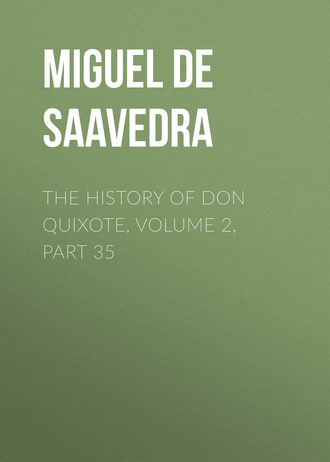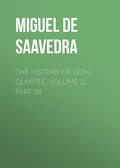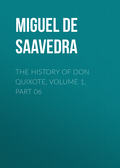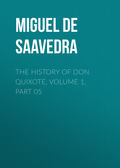
Мигель де Сервантес Сааведра
The History of Don Quixote, Volume 2, Part 35
"Rabble!" returned Don Quixote, "I care nothing for bulls, be they the fiercest Jarama breeds on its banks. Confess at once, scoundrels, that what I have declared is true; else ye have to deal with me in combat."
The herdsman had no time to reply, nor Don Quixote to get out of the way even if he wished; and so the drove of fierce bulls and tame bullocks, together with the crowd of herdsmen and others who were taking them to be penned up in a village where they were to be run the next day, passed over Don Quixote and over Sancho, Rocinante and Dapple, hurling them all to the earth and rolling them over on the ground. Sancho was left crushed, Don Quixote scared, Dapple belaboured and Rocinante in no very sound condition.
They all got up, however, at length, and Don Quixote in great haste, stumbling here and falling there, started off running after the drove, shouting out, "Hold! stay! ye rascally rabble, a single knight awaits you, and he is not of the temper or opinion of those who say, 'For a flying enemy make a bridge of silver.'" The retreating party in their haste, however, did not stop for that, or heed his menaces any more than last year's clouds. Weariness brought Don Quixote to a halt, and more enraged than avenged he sat down on the road to wait until Sancho, Rocinante and Dapple came up. When they reached him master and man mounted once more, and without going back to bid farewell to the mock or imitation Arcadia, and more in humiliation than contentment, they continued their journey.
CHAPTER LIX.
WHEREIN IS RELATED THE STRANGE THING, WHICH MAY BE REGARDED AS AN ADVENTURE, THAT HAPPENED DON QUIXOTE
A clear limpid spring which they discovered in a cool grove relieved Don Quixote and Sancho of the dust and fatigue due to the unpolite behaviour of the bulls, and by the side of this, having turned Dapple and Rocinante loose without headstall or bridle, the forlorn pair, master and man, seated themselves. Sancho had recourse to the larder of his alforjas and took out of them what he called the prog; Don Quixote rinsed his mouth and bathed his face, by which cooling process his flagging energies were revived. Out of pure vexation he remained without eating, and out of pure politeness Sancho did not venture to touch a morsel of what was before him, but waited for his master to act as taster. Seeing, however, that, absorbed in thought, he was forgetting to carry the bread to his mouth, he said never a word, and trampling every sort of good breeding under foot, began to stow away in his paunch the bread and cheese that came to his hand.
"Eat, Sancho my friend," said Don Quixote; "support life, which is of more consequence to thee than to me, and leave me to die under the pain of my thoughts and pressure of my misfortunes. I was born, Sancho, to live dying, and thou to die eating; and to prove the truth of what I say, look at me, printed in histories, famed in arms, courteous in behaviour, honoured by princes, courted by maidens; and after all, when I looked forward to palms, triumphs, and crowns, won and earned by my valiant deeds, I have this morning seen myself trampled on, kicked, and crushed by the feet of unclean and filthy animals. This thought blunts my teeth, paralyses my jaws, cramps my hands, and robs me of all appetite for food; so much so that I have a mind to let myself die of hunger, the cruelest death of all deaths."
"So then," said Sancho, munching hard all the time, "your worship does not agree with the proverb that says, 'Let Martha die, but let her die with a full belly.' I, at any rate, have no mind to kill myself; so far from that, I mean to do as the cobbler does, who stretches the leather with his teeth until he makes it reach as far as he wants. I'll stretch out my life by eating until it reaches the end heaven has fixed for it; and let me tell you, senor, there's no greater folly than to think of dying of despair as your worship does; take my advice, and after eating lie down and sleep a bit on this green grass-mattress, and you will see that when you awake you'll feel something better."
Don Quixote did as he recommended, for it struck him that Sancho's reasoning was more like a philosopher's than a blockhead's, and said he, "Sancho, if thou wilt do for me what I am going to tell thee my ease of mind would be more assured and my heaviness of heart not so great; and it is this; to go aside a little while I am sleeping in accordance with thy advice, and, making bare thy carcase to the air, to give thyself three or four hundred lashes with Rocinante's reins, on account of the three thousand and odd thou art to give thyself for the disenchantment of Dulcinea; for it is a great pity that the poor lady should be left enchanted through thy carelessness and negligence."
"There is a good deal to be said on that point," said Sancho; "let us both go to sleep now, and after that, God has decreed what will happen. Let me tell your worship that for a man to whip himself in cold blood is a hard thing, especially if the stripes fall upon an ill-nourished and worse-fed body. Let my lady Dulcinea have patience, and when she is least expecting it, she will see me made a riddle of with whipping, and 'until death it's all life;' I mean that I have still life in me, and the desire to make good what I have promised."
Don Quixote thanked him, and ate a little, and Sancho a good deal, and then they both lay down to sleep, leaving those two inseparable friends and comrades, Rocinante and Dapple, to their own devices and to feed unrestrained upon the abundant grass with which the meadow was furnished. They woke up rather late, mounted once more and resumed their journey, pushing on to reach an inn which was in sight, apparently a league off. I say an inn, because Don Quixote called it so, contrary to his usual practice of calling all inns castles. They reached it, and asked the landlord if they could put up there. He said yes, with as much comfort and as good fare as they could find in Saragossa. They dismounted, and Sancho stowed away his larder in a room of which the landlord gave him the key. He took the beasts to the stable, fed them, and came back to see what orders Don Quixote, who was seated on a bench at the door, had for him, giving special thanks to heaven that this inn had not been taken for a castle by his master. Supper-time came, and they repaired to their room, and Sancho asked the landlord what he had to give them for supper. To this the landlord replied that his mouth should be the measure; he had only to ask what he would; for that inn was provided with the birds of the air and the fowls of the earth and the fish of the sea.
"There's no need of all that," said Sancho; "if they'll roast us a couple of chickens we'll be satisfied, for my master is delicate and eats little, and I'm not over and above gluttonous."
The landlord replied he had no chickens, for the kites had stolen them.
"Well then," said Sancho, "let senor landlord tell them to roast a pullet, so that it is a tender one."
"Pullet! My father!" said the landlord; "indeed and in truth it's only yesterday I sent over fifty to the city to sell; but saving pullets ask what you will."
"In that case," said Sancho, "you will not be without veal or kid."
"Just now," said the landlord, "there's none in the house, for it's all finished; but next week there will be enough and to spare."
"Much good that does us," said Sancho; "I'll lay a bet that all these short-comings are going to wind up in plenty of bacon and eggs."






